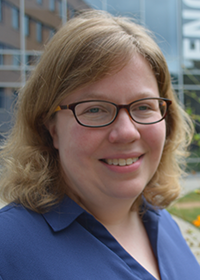“I want the classroom to be a place where we get energy from each other. You can’t just sit back and eat popcorn.”
Jill Nelson

Electrical engineering professor Jill Nelson engages with students in active learning environment.
Going to class isn’t a spectator sport.
It’s more like going to a gathering with people you enjoy but with an educational twist, says Jill Nelson, an associate professor in Mason Engineering’s Department of Electrical and Computer Engineering.
Her classroom goal is to keep students active and engaged in an informal setting. She asks questions. Students ask questions. She jokes. They joke. They all solve problems, discuss solutions, and share ideas.
“I want the classroom to be a place where we get energy from each other,” she says. “You can’t just sit back and eat popcorn.”
This is all part of an instructional style that earned Nelson the 2017 John Toups Medal for Excellence in Teaching, an award presented to a faculty member whose teaching exemplifies Mason’s commitment to innovation and excellence.
Nelson, who teaches undergraduate- and graduate-level classes in signal processing, is a proponent of active learning or student-centered learning, which means she demonstrates how to solve problems in class but spends a lot of time having students do problems. “When they go off the rails, I help them get back on,” she says, “and we talk about why this works and why that doesn’t work.”
A big part of the reason for this is that students learn by doing. If you really want to get better at basketball, you don’t watch a professional team practice for two hours, you practice yourself, Nelson says.
Learning involves making mistakes. “I want them to do something wrong or get stuck and have to talk to somebody, because if they can do everything—if I gave them problems that were the equivalent of two plus two—then they don’t need to be here,” she says.
Nelson prefers an interactive classroom to a lecture format, because it’s hard to stay focused for more than 10 or 15 minutes when someone is speaking, even if the speaker is super engaging. “The classroom is not network television, so I want them to be doing things because it will keep their brain involved.”
To encourage students to master the material, she gives short quizzes—called readiness assessment tests or RATs—at the beginning of every class, something they complain about loudly during the course, but by the end, they admit those assessments motivated them to learn.
Some of the topics she teaches are fascinating, but Nelson admits others can be tedious and boring. “I am honest with the students. I say, ‘Today we’re going to talk about filter implementation. This is dry. I’m going to give it to you as quickly as I can, and then let’s make sure we can figure out how to do it and go onto something more interesting.’”
Her students appreciate her dedication. “She is one of the best professors I’ve had here,” says Jeff Tucker, who took a signal processing class with her as an undergraduate and is in another one now as a graduate student. “I’ve learned tons from her. She’s very methodical in her approach. Rather than stand there and deliver a lecture, she intentionally makes class more interactive.”
Her class quizzes “aren’t pleasant, but they are good for you. It’s like engineering broccoli,” he says.
Tae Kim, a senior majoring in electrical engineering, describes Nelson as “a high-quality professor who cares for the students. She is the reason why I have such a strong level of understanding of the signals discipline of electrical engineering.”
In addition to teaching, Nelson is working with the Naval Undersea Warfare Center in Newport, Rhode Island, on a project that incorporates intelligence into sonar systems so they adapt to their environment.
She also recently spearheaded a solar eclipse project in which citizen scientists at about 150 sites across the country collected radio-wave measurements to try to understand what happens to the ionosphere during a solar eclipse.
Nelson discussed that project recently at “Nerd Nite” at a bar in Washington, D.C. It turned out better than she expected. “If they had all just stood there and drooled, I would have freaked out, but they were super engaged,” she says.
The biggest reward to teaching is changing students’ views of signal processing. “Some come in knowing what they want and they go out knowing what they want, but they could have been taught by a hedgehog, and it wouldn’t matter.”
Those who don’t come in motivated but go out motivated are the ones that make her the happiest. One student sent an email thanking her for teaching him “an abundant amount of essential material” in class that he is using at his job.
“Signals and systems are a little abstract, a little mathematical,” she says, “and sometimes people have trouble connecting and finding it interesting. So if someone says they didn’t find the subjects interesting until my class, that’s a success to me.”
“The classroom is not network television, so I want them to be doing things because it will keep their brain involved.”
Jill Nelson
